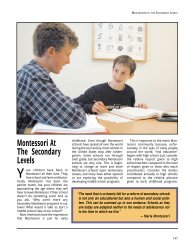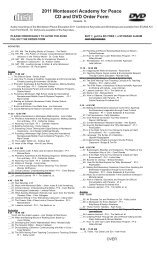Tim Seldin & Paul Epstein Ph.D. An Education for Life
Tim Seldin & Paul Epstein Ph.D. An Education for Life
Tim Seldin & Paul Epstein Ph.D. An Education for Life
You also want an ePaper? Increase the reach of your titles
YUMPU automatically turns print PDFs into web optimized ePapers that Google loves.
MONTESSORI PROGRAMS<br />
(Above) Students participate in a lesson on the geological folding of the Earth’s crust.<br />
who are given worksheets over and<br />
over again. These are children who are<br />
engaged.<br />
Montessori schools are normally<br />
small close-knit communities of children,<br />
teachers, and parents. They<br />
are like an extended family. Everyone<br />
knows everyone else. Children become<br />
close and remain friends with<br />
their teachers and both younger and<br />
older classmates. They grow up and<br />
study together <strong>for</strong> many years. While<br />
there may not be as many other children<br />
in the school as they would find<br />
in a larger school, their friendships will<br />
tend to be closer.<br />
Elementary Montessori students<br />
can move around. They don’t have<br />
to sit at a desk all day long. Students<br />
work together most of the time, either<br />
helping one another master skills and<br />
in<strong>for</strong>mation or on group projects.<br />
Parents are normally very involved at<br />
the elementary level as partners<br />
in supporting their children’s education.<br />
They may come in to teach lessons,<br />
take small groups out into the<br />
118<br />
community <strong>for</strong> field trips, and help<br />
with celebrations and per<strong>for</strong>mances.<br />
Elementary Montessori Teachers<br />
Serve as Mentors, Friends, and<br />
Guides<br />
The Elementary Montessori educator<br />
is not so much a “teacher” in the traditional<br />
sense as a “guide.” In more and<br />
more schools, this title is actually used<br />
to describe their role.<br />
The Elementary Montessori curriculum<br />
is very broad and requires the<br />
teacher to have a broad and thorough<br />
education of his or her own. With lessons<br />
that range from the history of<br />
mathematics to the physics of flight,<br />
mineralogy, chemistry, algebra, geometry,<br />
and literature, to name just a few,<br />
the average teacher would be lost.<br />
The best Elementary Montessori<br />
teachers are “renaissance” men and<br />
women; individuals who are equally<br />
interested in mathematics, the sciences,<br />
the arts, architecture, literature,<br />
poetry, psychology, economics, tech-<br />
nology, and philosophy. Beyond this,<br />
the Elementary Montessori educator<br />
needs patience, understanding, respect,<br />
enthusiasm, and a profound<br />
ability to inspire a sense of wonder and<br />
imagination. Such teachers are very<br />
rare, but they are absolutely magical!<br />
Becoming an Elementary Montessori<br />
teacher requires a year of graduate<br />
study and student teaching and countless<br />
hours of hard work to gather or<br />
create the curriculum materials that<br />
constitute a prepared Elementary<br />
Montessori environment.<br />
Academics<br />
The Elementary Montessori classroom<br />
offers an environment in which children<br />
tend to blossom! This may sound<br />
like propaganda, but it’s true!<br />
Dr. Montessori was convinced that<br />
children are born curious, creative,<br />
(Right) Elementary students often prefer to<br />
work on the floor with their friends.




